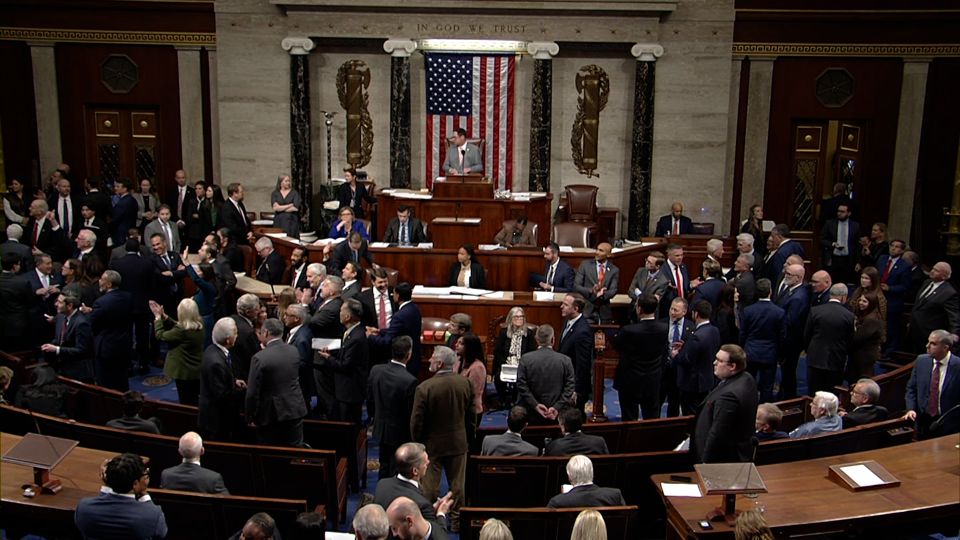Gambiaj.com – (WASHINGTON, DC) – The U.S. Senate on Tuesday agreed by unanimous consent to approve a House-passed bill requiring the Department of Justice to release all unclassified records linked to convicted sex offender Jeffrey Epstein, ending months of bitter political infighting and setting the legislation on a swift path to President Donald Trump’s desk.
The Senate’s rare procedural move, “deeming” the legislation passed the moment it arrives from the House, reflects how little appetite Republican senators had to reopen a battle that deeply divided the House GOP and became a potent line of Democratic attack.
All 99 senators present agreed to the expedited process after the Republican cloakroom ran a hotline and encountered no objections.
Senate Democratic Leader Chuck Schumer (N.Y.) received consent Tuesday evening to greenlight the Epstein Files Transparency Act immediately upon receipt from the House, only hours after the lower chamber passed it in a resounding 427–1 vote. Senate aides expected the paperwork to be finalized Tuesday night or early Wednesday.
“The Senate has now passed the Epstein bill as soon as it comes over from the House,” Schumer declared on the floor, calling the unanimous consent agreement a rare and significant step.
Republican senators, who for months argued that Congress lacked the authority to compel DOJ disclosures and that thousands of pages had already been released, ultimately dropped their objections. The overwhelming vote in the House, combined with mounting public pressure, left them little room to maneuver.
Sen. Lisa Murkowski (R-Alaska), in a statement moments after the floor action, called for accountability across the board.
“We need to enforce transparency and integrity at the highest levels of government,” she said. “It’s past time that all involved in Epstein’s illegal operation be brought to justice, so the survivors of these awful crimes can have closure.”
Political Pressure Forces a GOP Shift
The Senate’s sudden momentum comes after President Trump made an abrupt reversal, announcing this week that he would sign the legislation despite having spent months discrediting it as unnecessary and politically motivated.
“I’m all for it,” Trump told reporters Monday in the Oval Office, attempting to cast the scandal as “really a Democrat problem.”
Democrats, however, have accused Trump and GOP leaders of trying to keep potentially damaging records hidden to protect wealthy allies tied to Epstein’s network.
Earlier in the week, Senate Republicans had signaled they might delay action until December, expressing interest in amendments to shield innocent third parties and safeguard classified information. But the overwhelming House vote sharply undercut that argument.
Senate Majority Leader John Thune (R-S.D.) acknowledged the pressure.
“When a bill comes out of the House 427 to 1 and the president has said he’s going to sign it, I’m not sure that amending it is in the cards,” he said.
Thune added that Senate lawyers reviewed Speaker Mike Johnson’s concerns and found the bill “sufficient.”
House Turmoil Set the Stage
The legislation’s breakthrough came after a discharge petition, led by Rep. Thomas Massie (R-Ky.) and Rep. Ro Khanna (D-Calif.), forced the bill to the House floor. Newly sworn-in Rep. Adelita Grijalva (D-Ariz.) provided the 218th signature after weeks of delay caused by a prolonged government shutdown.
Massie urged senators not to interfere with the final product.
“Do not muck it up,” he warned outside the Capitol, flanked by Epstein victims. “If you add language that prevents any disclosure, you are not for the people.”
Four Republicans, Massie, Marjorie Taylor Greene (Ga.), Nancy Mace (S.C.), and Lauren Boebert (Colo.), joined Democrats in signing the discharge petition, defying party leadership.
Trump’s endorsement over the weekend helped break the stalemate. On Truth Social, he urged Republicans to vote yes, calling it “time to move on from this Democrat hoax.” The about-face followed reports that Trump had personally pressured GOP lawmakers, including Boebert and Mace, to stall the bill.
Next Stop: The President’s Desk
Once the House paperwork reaches the Senate, the bill will be formally “deemed passed” and immediately sent to President Trump for his signature, a procedural shortcut seldom used for high-profile legislation.
Only two Senate Republicans, Josh Hawley (Mo.) and Rand Paul (Ky.), previously supported Schumer’s amendment in September directing DOJ to release all unclassified Epstein-related files.
The final vote, or lack thereof, signals the end of one of Congress’s most protracted and politically charged battles of the year and the beginning of what could be a new wave of public scrutiny into one of America’s most notorious criminal networks.










